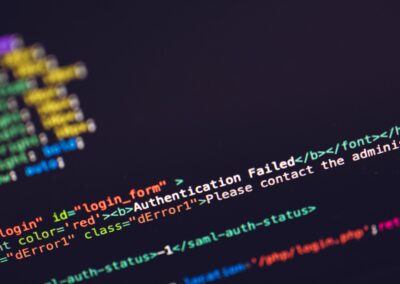Ensuring Digital Identity Security in Saudi Arabia and UAE
The Importance of Secure Digital Identity Management
Secure management of digital identities is a fundamental aspect of modern cybersecurity, particularly in regions like Saudi Arabia and the UAE, where digital transformation is a cornerstone of economic development. As businesses, government agencies, and individuals increasingly rely on digital interactions, the need to protect digital identities throughout their entire lifecycle becomes paramount. Digital identities encompass a wide range of data, from login credentials and personal information to digital certificates and access rights.
The rise of technologies such as Artificial Intelligence (AI), Blockchain, and the Metaverse has added layers of complexity to digital identity management. These technologies offer immense benefits but also introduce new risks. For instance, AI can streamline identity verification processes but also pose threats if used maliciously. Blockchain provides transparency and security but requires careful management to ensure privacy. The Metaverse, with its immersive virtual environments, presents unique challenges in identity verification and data protection.
In Riyadh, Dubai, and other major cities, ensuring the secure management of digital identities is critical for maintaining trust and safeguarding sensitive information. Businesses and government entities must adopt comprehensive strategies that address the entire lifecycle of digital identities, from creation and use to retirement and deletion.
Implementing Comprehensive Security Measures
One of the most effective strategies for secure management of digital identities involves implementing comprehensive security measures that cover all stages of the identity lifecycle. This includes robust methods for identity verification at the creation stage, such as multi-factor authentication (MFA) and biometric verification. MFA, which requires multiple forms of identification before granting access, significantly enhances security by making it harder for unauthorized individuals to compromise accounts.
During the usage phase, continuous monitoring and real-time threat detection are crucial. AI-driven analytics can play a vital role in identifying unusual patterns or behaviors that may indicate compromised identities. By leveraging AI, organizations can promptly respond to potential threats, minimizing the risk of unauthorized access. Additionally, encryption should be used to protect sensitive data at rest and in transit, ensuring that even if data is intercepted, it remains secure.
When digital identities are no longer needed, they should be securely retired and deleted to prevent misuse. This involves removing all associated access rights and ensuring that personal information is permanently erased. Regular audits and reviews of identity management practices can help identify and address any vulnerabilities in the process, ensuring ongoing protection.
Leveraging Advanced Technologies for Identity Management
Advanced technologies are essential for the secure management of digital identities. Blockchain technology, for instance, offers a decentralized and immutable way to manage digital identities, ensuring transparency and security. Blockchain can be used to create tamper-proof records of identity verification processes and access rights, providing a reliable way to track and manage identities throughout their lifecycle.
Artificial Intelligence (AI) can enhance identity management by automating verification processes and detecting anomalies in real-time. AI systems can analyze large datasets to identify patterns and detect potential security threats. This proactive approach allows organizations to address issues before they escalate, enhancing overall security.
The Metaverse, as an emerging digital space, requires unique identity management solutions. Implementing privacy-by-design principles in Metaverse platforms ensures that privacy features are integrated from the outset. This means giving users control over their digital identities and how their data is shared and used within these virtual environments. By prioritizing data protection and user consent, developers can create secure and user-friendly Metaverse experiences.
Creating a Culture of Digital Security
Promoting User Awareness and Education
Creating a culture of digital security is essential for the secure management of digital identities. This begins with promoting user awareness and education about the importance of digital identity protection. Users should be informed about best practices for creating and managing secure passwords, recognizing phishing attempts, and protecting their personal information online.
Regular training sessions and awareness campaigns can help users stay vigilant against potential security threats. By understanding how to identify and respond to these threats, users can take proactive steps to protect their digital identities. Encouraging users to regularly review their account activity and privacy settings also helps maintain security.
Furthermore, organizations should provide clear and accessible information about their digital identity management policies and practices. This transparency helps users make informed decisions about their data and how it is handled. Platforms can also offer tools and features that empower users to control their digital identities, such as privacy dashboards and account activity logs.
Enhancing Corporate Responsibility and Leadership
Strong corporate responsibility and leadership are essential for ensuring robust digital identity management. Executive coaching services can help leaders develop the skills needed to prioritize digital security within their organizations. This includes strategic planning, risk management, and fostering a culture of accountability and transparency.
Leaders must also stay informed about the latest developments in digital identity management technologies and practices. Continuous learning and professional development help leaders stay ahead of emerging threats and adapt their strategies accordingly. By prioritizing digital security at the highest levels, organizations can create a top-down commitment to protection that permeates all levels of the company.
Effective project management is also critical for implementing digital identity management measures. Project managers should ensure that security initiatives are well-planned, adequately resourced, and aligned with organizational goals. This involves coordinating efforts across different departments and ensuring that all stakeholders are engaged and informed throughout the process.
Conclusion: Securing the Future of Digital Identity Management
The secure management of digital identities is a multifaceted challenge that requires a combination of advanced technology, robust security measures, and a culture of vigilance and responsibility. In rapidly developing regions like Saudi Arabia and the UAE, where digital transformation is a key driver of growth, ensuring the security of digital identities is essential for maintaining trust and fostering sustainable development.
By implementing comprehensive security measures, leveraging modern technologies like AI and Blockchain, and promoting a culture of digital security through user education and strong leadership, organizations can effectively safeguard digital identities. This approach not only protects individuals’ privacy but also supports business success by enhancing trust and compliance with regulatory requirements.
#DigitalIdentityManagement #DataProtection #Cybersecurity #SaudiArabia #UAE #Riyadh #Dubai #ArtificialIntelligence #Blockchain #Metaverse #GenerativeAI #ModernTechnology #BusinessSuccess #Leadership #ProjectManagement























